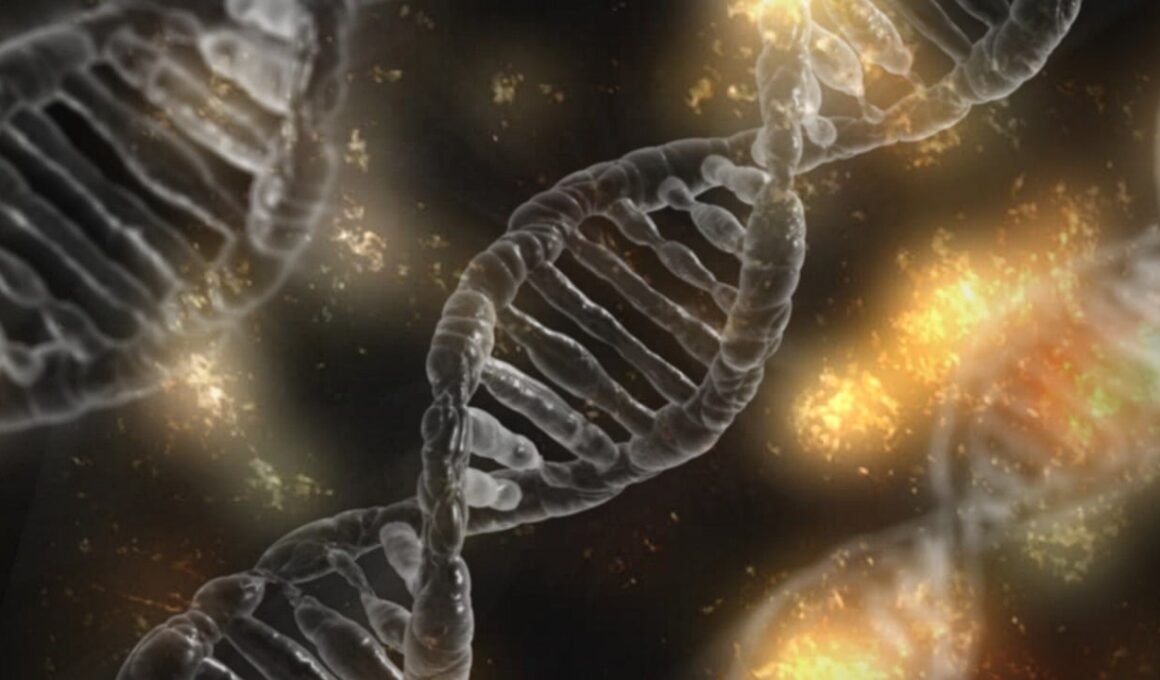Genetic Factors That Affect Nutrient Metabolism
Nutrition is a complex field, intersecting with various disciplines, including genetics. Many myths surrounding nutrition often overlook the influence of genetics on nutrient metabolism. These myths can lead to confusion, particularly regarding dietary recommendations and personal health strategies. For instance, some believe that diet is the sole factor influencing nutrient absorption. However, genetic predispositions can significantly impact how individuals process vitamins and minerals. Research indicates that genetic variations may affect enzyme activity, influencing nutrient utilization. For example, a person’s genetic makeup can determine their lactose tolerance, affecting milk consumption choices. Another common myth is that all individuals metabolize food similarly. In reality, genetic differences create variations in metabolism rates, meaning personalized nutrition is essential. Understanding these genetic factors encourages a more tailored approach to diet, moving away from one-size-fits-all recommendations. Genetic testing might provide insights into an individual’s nutritional needs, allowing for optimized nutrient intake. As we explore the interplay between genetics and nutrition, debunking these myths becomes vital for promoting a healthier, informed population.
Understanding Genetic Variations
Genetic variations are crucial in how individuals metabolize various nutrients. These variations can lead to differences in metabolic pathways, affecting how efficiently our bodies utilize certain substances. For instance, polymorphisms in genes related to vitamin D metabolism can significantly influence individual requirements for sunlight exposure and dietary intake. One fascinating aspect of genetics is the concept of nutrient-gene interactions. Certain nutrients can modify gene expression, or vice versa, highlighting a bi-directional relationship. For example, folate has been shown to influence gene stability, which is essential in cell division and reproduction. Additionally, some individuals have genetic variations that affect their taste preferences, influencing dietary choices. This phenomenon can lead to under or over-consumption of vital nutrients. Understanding such genetic predispositions helps identify potential deficiencies and can guide personalized nutrition. Moreover, genetic testing might serve as a tool for nutritionists and dietitians, allowing them to create targeted dietary plans. It opens up avenues for optimizing health and preventing diseases by linking genetic insights with nutritional needs.
Another common misconception is that dietary compliance alone can achieve optimal health, overlooking genetic influences. While diet plays a critical role in health, genetic factors significantly contribute to how individuals respond to dietary changes. For instance, the ability to metabolize caffeine varies greatly among people, depending largely on genetic makeup. Some may experience jitters and restlessness, while others enjoy energy boosts. Such differences highlight the need for personalized dietary recommendations, as blanket advice may not suit everyone. Furthermore, some genetic predispositions can heighten the risk of certain deficiencies. For example, individuals with specific variants in the MTHFR gene face challenges with folate metabolism, necessitating tailored dietary interventions. This underscores the importance of recognizing genetic nuances when crafting nutritional strategies. By acknowledging these genetic factors, health professionals can avoid perpetuating myths that suggest uniform responses to diets. Instead, they can promote individualized approaches that respect and incorporate genetic diversity. Emphasizing the interaction between genetics and nutrition fosters a deeper understanding of health and supports informed dietary choices.
Impact of Genomic Research on Nutrition
Advancements in genomic research are reshaping our understanding of nutrition by unveiling the complex relationship between genes and dietary habits. The Human Genome Project and subsequent studies have facilitated this enlightening journey. These studies have revealed specific genes linked to obesity, diabetes, and other metabolic conditions, paving the way for precision nutrition. For instance, understanding the FTO gene’s role illustrates how genetic factors can predispose individuals to weight gain, informing tailor-made dietary strategies. Genetic insights also help elucidate why some may thrive on high-carb diets while others struggle. This strikes at the heart of many dietary myths suggesting one diet leads to universal success. Moreover, developments in nutrigenomics, which studies how food impacts gene expression, provide intriguing possibilities for dietary interventions. By identifying gene-diet interactions, we can devise strategies to enhance health outcomes significantly. With this evolving knowledge, health professionals can move towards a more personalized approach to nutrition, one that acknowledges genetic variability. Ultimately, genomic research holds the potential to revolutionize how we approach dietary recommendations and improve overall health.
Another fascinating aspect is the role of epigenetics in nutrition. Epigenetic changes, influenced by diet and environment, can affect gene expression without altering the DNA sequence. This dynamic interaction emphasizes that what we eat can have lasting effects on our health. For example, a diet rich in antioxidants may improve gene expression related to inflammation. This indicates that, while our genetic makeup sets the stage, lifestyle choices can actively influence our health trajectory. Importantly, these insights remind us that nutrition doesn’t function in isolation. The interplay between genetics, epigenetics, and nutrition is complex and multifaceted. Thus, emphasizing the importance of a balanced diet enriched with a variety of nutrients is paramount. Moreover, recognizing that dietary changes can evoke epigenetic modifications promotes a proactive approach to health. This growing understanding has the potential to dispel myths suggesting fixed hereditary health outcomes. Instead, we learn about the transformative power of nutrition and lifestyle modifications. Embracing this knowledge encourages individuals to view their dietary choices not only as meal selections but as investments in their genetic future.
Practical Implications for Diet and Nutrition
Integrating genetic knowledge into dietary practices offers vital practical implications. Healthcare professionals can utilize genetic insights to guide their recommendations, allowing for more personalized nutrition plans. For instance, understanding an individual’s metabolic capabilities can help guide them in choosing foods that will optimize their health. Moreover, it helps in setting realistic dietary goals, considering genetic constraints. One practical application is offering personalized supplementation strategies based on genetic testing results. Tailoring vitamin and mineral supplementation according to genetic needs can enhance health outcomes significantly. Furthermore, educational initiatives aimed at dispelling myths surrounding genetic factors in nutrition become paramount. Teaching the general population about these aspects empowers informed decision-making. It also opens a constructive dialog regarding dietary practices. Nutritionists might focus on blending traditional dietary guidelines with genetic insights, creating a comprehensive framework for individual health management. Additionally, health technology apps that incorporate genetic data can help users track nutritional intake and recommend appropriate adjustments based on their genetic profiles. Embracing these advancements ensures that consumers take proactive steps toward improved well-being informed by tangible science.
In conclusion, the role of genetics in nutrient metabolism cannot be understated. While the influence of diet and lifestyle on health is recognizable, genetic factors intricately weave into this narrative. By acknowledging the biological basis for variances in nutrient metabolism, we empower individuals to make nutritional choices that align with their unique genetic profiles. Debunking myths surrounding nutrition through a genetic lens aids public understanding and encourages evidence-based practices. Moreover, educating individuals about the significance of genetic variations helps foster a sense of ownership over personal health. As science continues to uncover the complexities of the human genome, our approach to nutrition will inevitably evolve. The future of nutritional science lies in recognizing and embracing these genetic differences. Ultimately, integrating genetic insights into everyday dietary choices promotes a healthier population prepared for the challenges ahead. It champions a shift toward personalized nutrition, paving the way for future advancements in health care, wellness, and prevention. Through this journey, we celebrate the synergy between genetics and nutrition, reinforcing the narrative that health is a multifaceted construct influenced by many interrelated factors.
Another common misconception is that dietary compliance alone can achieve optimal health, overlooking genetic influences. While diet plays a critical role in health, genetic factors significantly contribute to how individuals respond to dietary changes. For instance, the ability to metabolize caffeine varies greatly among people, depending largely on genetic makeup. Some may experience jitters and restlessness, while others enjoy energy boosts. Such differences highlight the need for personalized dietary recommendations, as blanket advice may not suit everyone. Furthermore, some genetic predispositions can heighten the risk of certain deficiencies. For example, individuals with specific variants in the MTHFR gene face challenges with folate metabolism, necessitating tailored dietary interventions. This underscores the importance of recognizing genetic nuances when crafting nutritional strategies. By acknowledging these genetic factors, health professionals can avoid perpetuating myths that suggest uniform responses to diets. Instead, they can promote individualized approaches that respect and incorporate genetic diversity. Emphasizing the interaction between genetics and nutrition fosters a deeper understanding of health and supports informed dietary choices.


